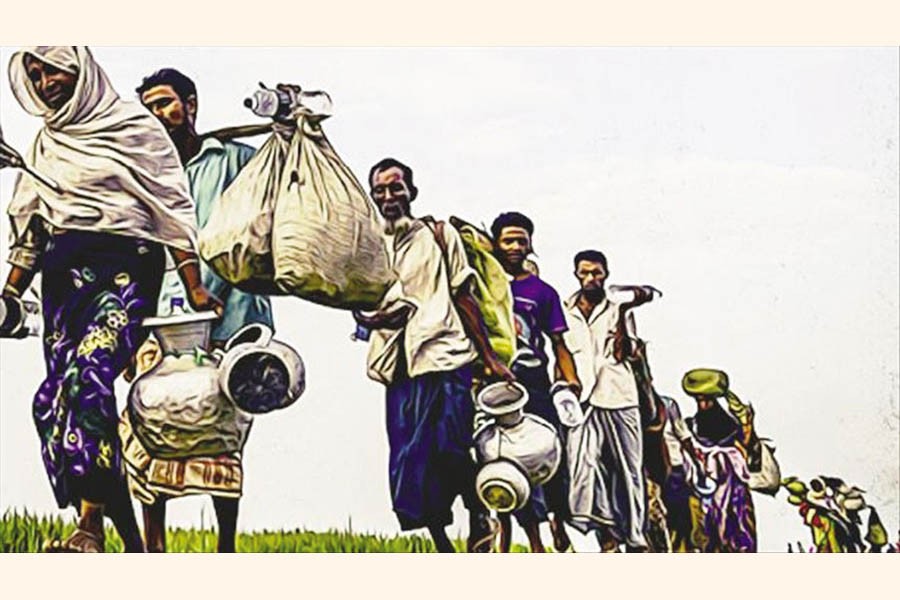Myanmar's violent ethnic cleansing which forced roughly a million Rohingya Muslims into Bangladeshi refugee camps is going to mark its fifth anniversary in August next. Myanmar's persecution of Rohingya Muslims is not new. Such waves of emigration were recorded in 1978, 1992, and most recently in 2017.
The start of a horrific military attack against the Rohingya people in Myanmar, which prompted three quarters of a million Rohingya to flee the country was nearly five years ago on August 5 in 2017. The Myanmar military's deliberate, systematic, and extreme violence like killings and sexual assault displaced Rohingya from their homeland. It has been correctly labeled as genocide, violence "committed with intent to destroy, in whole or in part, a national, ethnical, racial, or religious group." Though the persecution of Rohingya in Myanmar did not begin on this date (it has been going on for decades), it was undoubtedly one of the largest and most methodical attacks against the minority in recent years. The unprecedented floods of Rohingya people and other communities from Myanmar's Rakhine State into Bangladesh began almost five years ago.
Following a briefing by the UN Secretary General's Special Envoy to Myanmar, Bangladesh's permanent representative addressed the UN General Assembly on June12 last urging the UN to expand its programmes in Rakhine State, Myanmar, to help the forcibly displaced Rohingya to return home. The envoy further sought the Special Envoy's endeavor to ensure that the bilateral arrangements for Rohingya refugees to return home from Bangladesh are implemented as soon as possible.
Bangladesh's representative to the UN was quite explicit in her speech. It's been nearly 5 years. In one of the worst man-made humanitarian tragedies in modern history, almost a million Rohingya were forced to flee their homes. And the assurance of their safe return has yet to be fulfilled.
We're also concerned because the Russian invasion of Ukraine has shifted the world's attention away from Rohingya migrants and toward millions of fleeing Ukrainians seeking asylum in a number of European nations. The Rohingya agenda can take a backseat amid the ongoing war and the rapidly changing world order.
The point is that Myanmar is at the heart of the Rohingya catastrophe. The ruling military junta in that country must step up efforts to secure the refugees' voluntary and dignified return.
Bangladesh has done more than enough to accommodate over a million Rohingya refugees at enormous economic, environmental, and security costs; now it is time for the UN to assess the situation. Bangladesh's efforts alone will not be sufficient to bring about a long-term solution to the situation.
At the same time, accountability for all transgressions and atrocities in Myanmar is critical. As a result, we would like to remind the UN Security Council of keeping an eye on the International Court of Justice (ICJ) provisional measures in the case brought by Gambia on behalf of the OIC.
The international community, particularly UN member nations, has a humanitarian responsibility for solving the Rohingya crisis.
The world community must awake from the slumber and see that the man-made crisis was not caused by Bangladesh, rather by Myanmar's internal turmoil, which was unfairly imposed on Bangladesh.
Despite a series of UN resolutions, Myanmar has showed little interest in repatriating the refugees in dignity and with full citizenship rights.
Apart from UN member states, regional countries and Myanmar's commercial partners, such as China, India, Japan, Indonesia, and Germany, ASEAN and OIC countries must also step up to put pressure on Myanmar to solve the humanitarian situation seriously.
Last but not least, if the international community fails to find a long-term solution to the humanitarian catastrophe, it must commit to taking in a million or more forcibly-displaced refugees currently sheltered in Bangladesh, as it did with many other refugees in the past.
We urge immediate action to assist in making significant progress in building the conditions for safe, voluntary, dignified and long-term return of refugees to Myanmar. It is vital to address the core causes of Myanmar's systematic discrimination, disenfranchisement and communal violence.
We also urge the world community to stand firm in solidarity with Rohingya refugees, as well as the government of Bangladesh and the people who stood by them in the time of their need. Ahead of the fifth anniversary of the Rohingya crisis, we urge the world to do something for the refugees. They have the right to live in their birthplace, Myanmar, with dignity.

- Sunday, 17 November 2024 |
- Today's FE |
- e-Paper |
- Beta Website

